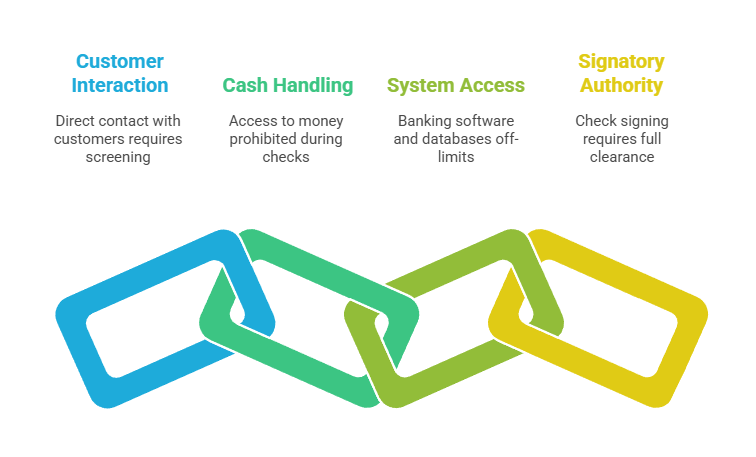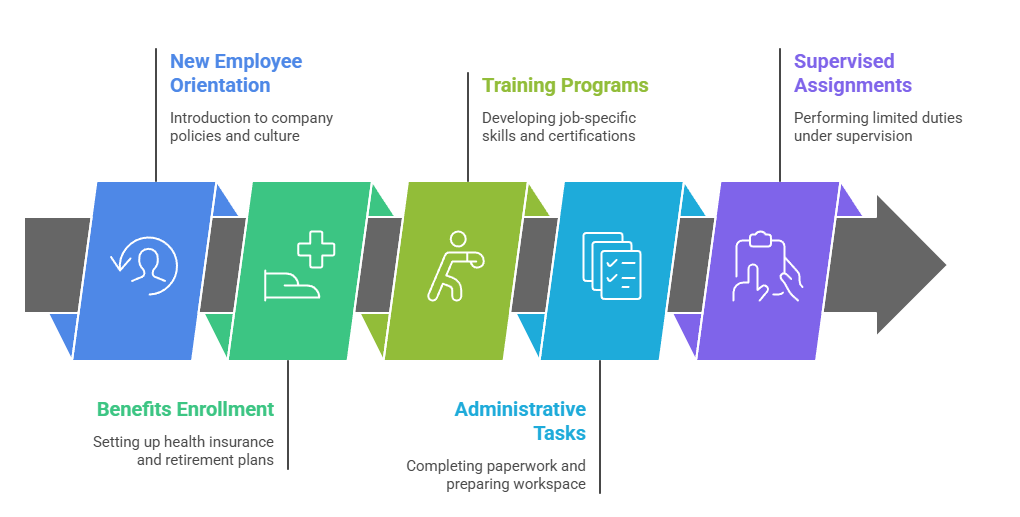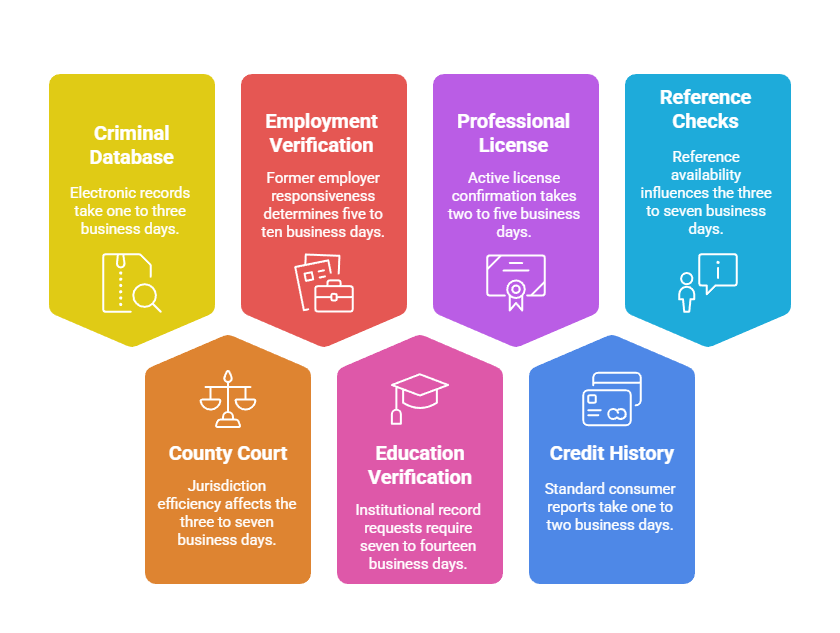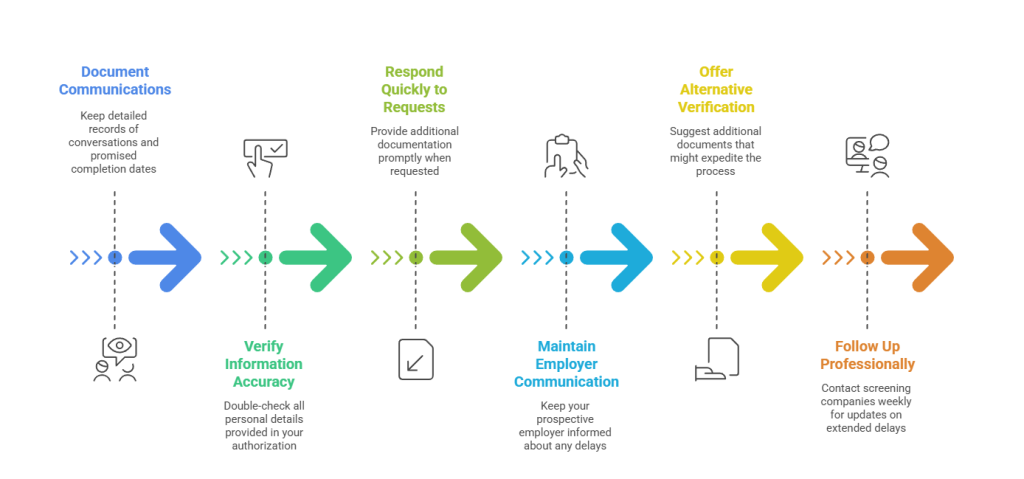While federal law doesn't prohibit working during a pending background check, employer policies and industry regulations often determine whether you can start employment before results are finalized. Understanding your rights under the FCRA and state laws helps navigate this common employment situation effectively.
Key Takeaways
- Most private employers can legally allow you to work while background checks are being processed, though company policies vary significantly.
- Government positions and regulated industries like healthcare, finance, and transportation typically require completed background checks before employment begins.
- The Fair Credit Reporting Act (FCRA) gives you specific rights during the background check process, including notification requirements and dispute procedures.
- Conditional job offers protect both employers and employees by establishing clear expectations while background verification is pending.
- Background check delays lasting longer than two weeks may indicate complications that require direct communication with your employer.
- State laws in California, New York, and other jurisdictions provide additional protections beyond federal requirements for job applicants.
Legal Framework for Working During Background Verification
The question of whether you can work while the background check is pending depends on multiple legal factors. Federal employment law doesn't explicitly prohibit starting work before background verification completes. However, various regulations and industry standards influence these decisions.
Under the Fair Credit Reporting Act, employers must follow specific procedures when conducting employment background checks. These procedures include providing proper notifications and obtaining consent. Nevertheless, the FCRA doesn't mandate that background checks must be completed before work begins. This regulatory gap allows employers considerable flexibility in determining their hiring timelines.
Most employment relationships in the United States operate under at-will employment principles. This means both employers and employees can terminate the relationship at any time for lawful reasons. Furthermore, this framework enables employers to make conditional offers and adjust employment terms based on background check results. The legal landscape becomes more complex when considering industry-specific regulations and state-level employment protections that may impose additional requirements on the background screening process.
Understanding Your Rights Under Federal Law
Federal employment law provides important protections during the background verification process. The Fair Credit Reporting Act serves as the primary framework governing how employers can use consumer reports for hiring decisions. Additionally, the Equal Employment Opportunity Commission provides guidance on avoiding discriminatory practices during background screening.
Key federal protections include:
- Pre-adverse action notices: Employers must notify you before taking negative action based on background results
- Report disclosure requirements: You have the right to receive copies of any reports used in employment decisions
- Dispute resolution procedures: Direct channels to challenge inaccurate information with screening companies
- Reasonable response time: Adequate opportunity to provide context or corrections before final decisions
- Written authorization requirements: Clear consent before any background investigation begins
These federal protections create a baseline level of rights for all job seekers nationwide. However, many states have enacted additional protections that go beyond federal minimums.
State Laws That Impact Employment During Background Checks
State employment laws often provide enhanced protections for job applicants undergoing background screening. These laws recognize that background checks can create barriers to employment opportunities. Consequently, many states have implemented fair chance legislation to address these concerns.
California's Fair Chance Act limits how employers can use criminal history information in hiring decisions. The law requires employers to conduct individualized assessments before denying employment based on criminal records. Moreover, it delays criminal background inquiries until after conditional job offers are made.
New York City's Fair Chance Act provides similar protections for job applicants with criminal histories. The law prohibits most employers from asking about criminal history during the initial application process. Instead, background checks can only be conducted after extending conditional job offers. This approach allows candidates to demonstrate their qualifications before criminal history becomes a factor.
| State/City | Key Protection | Timing Requirement | Industries Covered |
| California | Individualized assessment | After conditional offer | Most private employers |
| New York City | Delayed inquiry | After conditional offer | Private employers 4+ employees |
| Philadelphia | Fair chance hiring | After conditional offer | All employers |
| Seattle | Criminal history protection | After initial interview | Private employers 15+ employees |
Industry-Specific Requirements and Restrictions
Different industries face varying levels of regulation regarding background check requirements. These regulations determine whether employers can allow work during pending verification. Understanding industry-specific rules helps set appropriate expectations for your situation.
Government and Security Positions

Federal, state, and local government positions typically require completed background investigations before employment begins. Security clearance positions involve extensive vetting processes that can take several months to complete. Agencies like the Department of Defense, FBI, and CIA maintain strict protocols requiring full clearance before accessing sensitive information or facilities.
The government sector operates under heightened security requirements that prioritize national security and public safety. These positions often involve access to classified information, sensitive facilities, or critical infrastructure. As a result, most government employers cannot allow work to begin until thorough background investigations are complete.
Healthcare and Medical Fields

Healthcare organizations must comply with regulations from multiple agencies and licensing boards. The Centers for Medicare & Medicaid Services require background checks for employees with patient access. Additionally, state licensing boards often mandate criminal history screening for healthcare workers.
Many hospitals and medical facilities require completed background checks before allowing direct patient contact. However, some healthcare employers permit administrative roles or training during the screening period. This flexibility helps address ongoing staffing shortages in the healthcare industry while maintaining patient safety standards.
Financial Services and Banking

The banking industry operates under strict regulatory oversight from federal agencies. The FDIC, OCC, and Federal Reserve maintain specific requirements for employee screening. Financial institutions typically cannot allow employees to handle money or access customer information until background checks are cleared.
Common restrictions in financial services include:

- Customer interaction: Direct contact with banking customers requires completed screening
- Cash handling: Access to money or financial instruments prohibited during pending checks
- System access: Banking software and customer databases remain off-limits
- Signatory authority: Check signing or account authorization requires full clearance
Some banks permit limited training or orientation activities while screening is pending. However, these activities must not involve customer interaction or sensitive financial information.
Transportation and Logistics

The Department of Transportation regulates background check requirements for safety-sensitive positions. Commercial drivers, pilots, and other transportation workers must complete screening before performing regulated duties. These requirements prioritize public safety in transportation systems.
Additionally, logistics companies handling government contracts face additional screening requirements. The Transportation Security Administration mandates background checks for workers with access to secure areas of airports. Similarly, port workers and freight handlers may need security clearances for certain facilities.
How Conditional Employment Offers Work
Conditional job offers represent the most common approach for managing employment during pending background checks. These offers balance business needs with risk management while ensuring legal compliance. Moreover, they provide clarity for both employers and job seekers about expectations during the verification process.
A conditional offer typically includes specific language stating that employment remains contingent upon satisfactory background check results. Employers may allow new hires to begin certain activities while maintaining the right to terminate employment if results prove unsatisfactory. This approach enables business operations to continue while protecting employer interests.
Typical conditional employment activities include:

- New employee orientation: Company policies, procedures, and culture introduction
- Benefits enrollment: Health insurance, retirement plans, and other employee benefits setup
- Training programs: Job-specific skills development and certification courses
- Administrative tasks: Paperwork completion, system setup, and workspace preparation
- Supervised assignments: Limited duties under direct management oversight
Smart employers communicate clearly about conditional employment terms throughout the process. They maintain detailed documentation of all activities and restrictions during the conditional period. This documentation protects both parties and ensures compliance with applicable employment laws.
Timeline Expectations for Different Types of Background Checks
Background check processing times vary significantly based on verification scope and record-keeping system efficiency. Understanding typical timelines helps set realistic expectations during the waiting period. Additionally, knowing what factors influence processing speed can help you prepare accordingly.
Standard employment screens typically complete within three to seven business days for most applicants. However, comprehensive investigations involving multiple verification sources can take several weeks or longer. International background checks often require extended processing times due to varying record-keeping systems and legal requirements.
Processing timeframes by verification type:

- Criminal database searches: One to three business days for electronic records
- County court searches: Three to seven business days depending on jurisdiction efficiency
- Employment verification: Five to ten business days based on former employer responsiveness
- Education verification: Seven to fourteen business days for institutional record requests
- Professional license checks: Two to five business days for active license confirmation
- Credit history reports: One to two business days for standard consumer reports
- Reference checks: Three to seven business days depending on reference availability
Delays frequently occur when verification sources don't respond promptly to screening company requests. Court records from smaller jurisdictions may take longer to obtain due to limited staff or manual record systems. Furthermore, international background checks can extend timelines significantly due to varying legal frameworks and processing procedures.
Common Reasons for Background Check Delays
Several factors can cause background check delays beyond typical processing timeframes. Understanding these common causes helps manage expectations and identify when additional action may be necessary. Moreover, recognizing delay patterns can help you address potential issues proactively.
Administrative errors represent one of the most common causes of background check delays. Small discrepancies in personal information can prevent proper record matching. Name variations, address changes, or date inconsistencies often require manual review and additional verification steps.
Frequent delay factors include:
- Incomplete personal information: Missing addresses, name variations, or incorrect dates
- Court system backlogs: Heavy caseloads affecting record retrieval timeframes
- Verification source delays: Slow responses from schools, employers, or licensing boards
- International record requests: Complex legal requirements and processing procedures
- Holiday and vacation periods: Reduced staffing at verification sources
- Technical system issues: Database maintenance or connectivity problems
Record accuracy issues also contribute to processing delays when screening companies encounter conflicting information. Multiple records with similar identifying information may require additional verification steps. Furthermore, sealed or expunged records can create confusion that requires legal clarification before proceeding.
What to Do When Background Checks Take Too Long
Extended background check delays can create stress and uncertainty for job seekers and employers alike. Taking proactive steps helps address potential issues while maintaining positive relationships throughout the process. Additionally, understanding when delays become unreasonable helps you advocate effectively for timely resolution.
Start by reviewing your background check authorization forms and any communications from the screening company. Ensure you provided accurate information and responded promptly to any requests for additional documentation. Even minor errors can cause significant delays in the verification process.
Contact the background screening company directly if delays exceed reasonable timeframes for your situation. Many screening providers offer candidate portals or customer service lines specifically for status updates. Be prepared to provide your case number or reference information when requesting updates.
Effective strategies for managing delays:

- Document all communications: Keep detailed records of conversations and promised completion dates
- Verify information accuracy: Double-check all personal details provided in your authorization
- Respond quickly to requests: Provide additional documentation promptly when requested
- Maintain employer communication: Keep your prospective employer informed about any delays
- Offer alternative verification: Suggest additional documents that might expedite the process
- Follow up professionally: Contact screening companies weekly for updates on extended delays
Remember that background check delays don't necessarily indicate problems with your application or criminal history. System backlogs, vacation periods, and administrative processing issues cause most extended timelines. Stay professional and patient while advocating appropriately for reasonable resolution timeframes.
How to Communicate with Employers During the Process
Maintaining professional communication with your prospective employer throughout the background check process helps build positive relationships. Clear communication demonstrates your continued interest in the position while respecting the verification requirements. Furthermore, proactive updates can prevent misunderstandings about timeline expectations.
Ask about expected timelines during your initial job offer conversations to establish baseline expectations. Most employers can provide general timeframes based on their typical screening processes. However, be prepared for variations based on your specific background and verification requirements.
Don't hesitate to follow up if the process extends beyond originally communicated timeframes without explanation. Professional check-ins demonstrate engagement without appearing pushy or impatient. Additionally, these communications provide opportunities to address any concerns that may have arisen during screening.
Best practices for employer communication:
- Set initial expectations: Ask about typical processing times during offer discussions
- Provide accurate information: Ensure all details on applications and forms are correct
- Report known delays: Inform employers if screening companies notify you of processing issues
- Maintain professional tone: Keep all communications courteous and business-appropriate
- Express continued interest: Reinforce your enthusiasm for the position during updates
- Be patient but engaged: Balance patience with appropriate follow-up communications
Effective communication during background checks can actually strengthen your relationship with your future employer. It demonstrates professionalism, reliability, and good communication skills that benefit you in the long term.
Potential Consequences of Working During Pending Checks
Working while your background check is pending can have various consequences depending on the results and employer policies. Understanding these potential outcomes helps you make informed decisions about accepting conditional employment offers. Additionally, knowing your rights during this process protects you if issues arise.
Most employers who allow work during pending background checks have clear policies about what happens if negative information surfaces. These policies typically include immediate termination procedures and specific notification requirements. However, federal and state laws provide important protections during this process.
If adverse information appears on your background check while you're working, employers must follow Fair Credit Reporting Act procedures before taking employment action. This includes providing pre-adverse action notices and copies of the background report. You then have time to review the information and respond with explanations or corrections.
Possible outcomes when issues arise:
- Immediate termination: Some employers terminate employment immediately upon receiving adverse results
- Suspension pending review: Temporary removal from duties while investigating background issues
- Role modification: Assignment to different duties that don't conflict with background findings
- Probationary period: Extended evaluation period with additional oversight and restrictions
- No action taken: Employer determines background issues don't affect job performance
The severity of consequences often depends on the nature of background check findings and their relevance to your job duties. Minor issues unrelated to your work responsibilities may have minimal impact. However, findings directly related to job requirements typically result in more serious consequences.
Steps to Take If Your Background Check Contains Errors
Background check errors occur more frequently than many people realize and can significantly impact employment opportunities. The Federal Trade Commission estimates that one in five consumer reports contains errors that could affect employment decisions. Therefore, knowing how to dispute inaccurate information protects your employment prospects and legal rights.
When you receive a copy of your background check, review it carefully for accuracy and completeness. Look for incorrect personal information, inaccurate criminal records, or missing context about past issues. Additionally, check for outdated information that may no longer be legally reportable under state or federal laws.
Contact the background screening company immediately if you identify errors or incomplete information on your report. Consumer reporting agencies must investigate disputed information within 30 days under FCRA requirements. They must also notify information sources about disputes and correct or remove inaccurate data.
Error dispute process steps:
- Document all errors: Create detailed lists of inaccurate or incomplete information
- Contact screening company: Submit disputes in writing with supporting documentation
- Notify your employer: Inform them about disputed information and ongoing investigations
- Gather supporting evidence: Collect court records, certificates, or other relevant documents
- Follow up regularly: Monitor dispute progress and request updates from screening companies
- Request corrections: Ensure accurate information replaces disputed items in your file
Keep detailed records of all dispute communications and supporting documentation throughout the process. This documentation helps protect your rights and provides evidence if further legal action becomes necessary.
Industry Best Practices for Employers and Job Seekers
Both employers and job seekers benefit from following established best practices during the background check process. These practices promote fairness, efficiency, and legal compliance while building positive employment relationships. Moreover, they help prevent common issues that can delay hiring or create unnecessary complications.
Employers should maintain clear, written policies about background check procedures and conditional employment arrangements. These policies should specify what types of findings may affect employment decisions and include procedures for addressing disputed information. Additionally, regular policy updates ensure compliance with changing legal requirements.
Job seekers should prepare for background checks by gathering relevant documentation and reviewing their own records for accuracy. This preparation includes obtaining copies of criminal records, employment histories, and educational transcripts to verify accuracy. Furthermore, being proactive about potential issues demonstrates honesty and professionalism to employers.
| Best Practice Category | Employer Responsibilities | Job Seeker Actions |
| Communication | Clear timeline expectations | Prompt response to requests |
| Documentation | Written policy procedures | Personal record verification |
| Legal Compliance | FCRA procedure adherence | Rights awareness and exercise |
| Issue Resolution | Fair dispute handling | Proactive error reporting |
Following these best practices creates smoother background check processes for everyone involved. They also help build trust and positive relationships that benefit long-term employment success.
Conclusion
Working while your background check is pending depends on employer policies, industry regulations, and the specific nature of your intended role. While federal law generally permits conditional employment during verification, many employers choose to wait for completed results to minimize risk and ensure compliance. Understanding your rights under the FCRA and state laws empowers you to navigate this process effectively. Additionally, maintaining professional communication and being prepared for various outcomes helps create the best possible experience. Remember that background check timelines vary significantly, so patience combined with appropriate follow-up creates successful outcomes for all parties involved.
Frequently Asked Questions
Is it legal for employers to let you work before your background check is complete?
Yes, federal law generally permits employers to allow work during pending background checks. However, industry regulations, company policies, and state laws may impose additional restrictions that require completed verification before employment begins.
How long can you work without a completed background check?
There's no federal legal limit on working with a pending background check, but most employers set internal deadlines of 30-60 days for completing verification. Industry-regulated positions often have stricter timeframes mandated by regulatory agencies.
What happens if your background check comes back with issues while you're working?
Employers must follow FCRA procedures, including providing pre-adverse action notices and copies of background reports before terminating employment. You have rights to dispute inaccurate information and provide context for any findings.
Can you start training or orientation before background results are available?
Many employers allow training, orientation, and administrative setup during background verification. However, access to sensitive systems, customer information, or regulated activities typically requires completed clearance.
Do government jobs allow work during pending background investigations?
Most government positions require completed background investigations before beginning work. Security clearance positions particularly maintain strict protocols prohibiting access until full verification is complete.
What should you do if your background check is taking longer than expected?
Contact the screening company for status updates, verify that you provided accurate information, and maintain communication with your prospective employer. Document timelines and be prepared to provide additional verification documents if requested.
Are there state laws that affect working during background checks?
Yes, states like California and New York have enhanced protections that limit how employers use background information and may affect timing of employment decisions. Check your state's specific requirements for additional protections beyond federal law.
Can employers revoke job offers based on pending background check results?
Yes, but employers must follow proper FCRA procedures including pre-adverse action notices and opportunities for candidates to respond to adverse findings before making final employment decisions.
Additional Resources
- Fair Credit Reporting Act (FCRA) Guide for Employees
https://www.consumer.ftc.gov/articles/pdf-0096-fair-credit-reporting-act.pdf - EEOC Guidance on Background Checks and Employment
https://www.eeoc.gov/newsroom/eeoc-issues-enforcement-guidance-consideration-arrest-and-conviction-records-employment - State-by-State Fair Chance Employment Laws
https://www.nelp.org/publication/fair-chance-ban-the-box-laws/ - Background Check Rights and Dispute Procedures
https://www.consumerfinance.gov/ask-cfpb/what-should-i-do-if-i-think-there-are-errors-on-my-background-check-en-2017/ - Industry-Specific Background Check Requirements
https://www.shrm.org/resourcesandtools/tools-and-samples/toolkits/pages/backgroundchecks.aspx

GCheck Editorial Team
Meet the GCheck Editorial Team, your trusted source for insightful and up-to-date information in the world of employment background checks. Committed to delivering the latest trends, best practices, and industry insights, our team is dedicated to keeping you informed.
With a passion for ensuring accuracy, compliance, and efficiency in background screening, we are your go-to experts in the field. Stay tuned for our comprehensive articles, guides, and analysis, designed to empower businesses and individuals with the knowledge they need to make informed decisions.
At GCheck, we're here to guide you through the complexities of background checks, every step of the way.






